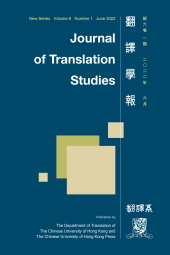 |
|
||||||||||||||||||||||||||||||||||||||||||||||||||||||||||||||||||||||||||||||||||||||||||||||||
| 「作為一名國際代理人」:威妥瑪(Thomas Francis Wade, 1818–1895)在香港的政治翻譯等活動 |
|---|
| 馬騰飛 (Tengfei Ma) 中國香港 香港中文大學 |
|
摘 要 威妥瑪(Thomas Francis Wade, 1818–1895)是英國著名外交官和漢學家。1842年6月2日,身為中尉的他抵達香港,隨英軍第98軍團參與中英第一次鴉片戰爭。在香港休整期間,自學中文,並希望成為「一名國際代理人」,即官方譯員。1846年1月,他再次來到香港,並放棄軍銜,擔任外交譯員。直到1852年3月離開,他在香港工作長達六年之久。不過,他在香港擔任譯員的這段經歷幾乎被學界所忽視,大多數中外學者都只處理他的外交官身份和漢學家身份。 本文通過分析大量原始資料—主要為英國外交部檔案,重構威妥瑪在香港「作為一名國際代理人」的經歷。通過分析他翻譯《京報》、研究中國政府和國情、翻譯《海國圖志》的日本篇以及研究中國軍隊,展現他根據政治、外交形勢的變化,主動調整「代理」的身份和範圍,從而影響兩國之間的關係。本文指出,威妥瑪作為「國際代理人」,不僅處理語言文字工作,更積極介入政治、外交,並有自己的政治、外交、文化立場;在「為女王陛下服務」這個大的框架下,藉翻譯和研究等活動,為國家之間的政治、外交利益進行「代理」,足見外交譯員在近代中英政治、外交上所扮演的重要角色。 Abstract Thomas Francis Wade (1818–1895) was a famous British diplomat and sinologist. On 2 June 1842, he arrived in Hong Kong as a lieutenant and then participated in the first Sino-British Opium War with the British 98th regiment. During his convalescence in Hong Kong, he taught himself the Chinese language and hoped to be “an international agent” (an official interpreter). In January 1846, he returned to Hong Kong and gave up his military rank to serve as a diplomatic interpreter. After working in Hong Kong for approximately six years, he left for London in March 1852. However, little research has been done on Wade as a diplomatic interpreter in Hong Kong. Academic attention, both Chinese and English alike, has been mostly paid to him as a diplomat or a sinologist only. Based on a large volume of first-hand materials, the present article reconstructs Wade’s experience “as an international agent” in Hong Kong. By analyzing his translation of Peking Gazette, his study on the Chinese government and conditions, his translation of the twelfth chapter of the Hai-kwoh Tu Chi, and his study of the Chinese army, this paper shows that he actively adjusted the scope of his role as an international agent in accordance with the changes in the politicodiplomatic situation, thereby influencing the relationship between Britain and China. Casting light on the importance of diplomatic interpreters in shaping modern Sino-British relations, this article points out that Wade, as an interpreter, was actively involved in politicodiplomatic activities through translation and research while in Her Majesty’s service and, as an interpreter, had his own political, diplomatic, and cultural agenda. |
| 香港早期文學期刊連載的翻譯研究:以《新小說叢》(1907–1908)為例 |
|---|
| 李波 (Bo Li) 中國香港 嶺南大學 |
|
摘 要 學界對二十世紀之交上海文學期刊中翻譯的研究越來越多,但對香港同期中文期刊的文學翻譯的研究卻不多。在文獻回顧的基礎上,本文首先從期刊「內部對話性」和「外部對話性」的角度,對香港《新小說叢》的連載翻譯文學進行整體描述;其次,本文對該刊連載的翻譯作品《情天孽障》進行個案研究,並與同一時期同一作品刊載於上海文學期刊《小說林》的《第一百十三案》進行文本細讀與比較。本研究聚焦迄今較少受到關注的香港期刊連載翻譯文學,通過搜尋和細讀現存期刊資料,對期刊中兩個譯文的相異之處進行了梳理和總結,從女性形象、法律思想和司法制度、宗教等維度對兩個譯本進行了分析,揭示了這一時期西方翻譯作品與兩地社會與文化的互動。 Abstract Substantial research has been done on the translations in literary periodicals in Shanghai at the turn of the twentieth century, while the literary periodicals in Hong Kong remain largely unattended. This paper will offer a panoramic view of the serialized literary translation in Xinxiaoshuo cong 新小說叢 (Collection of new fiction) (1907–1908) in Hong Kong from “internal dialogics” and “external dialogics.” The case study will focus on the Chinese translation of The File No. 113 by early French detective writer, Emile Gaboriau, in the periodical. Comparison will be made with another Chinese rendition in Xiaoshuo lin 小說林 (Fiction forest). This paper aims to investigate the serialized literary translation in Hong Kong periodicals and make a comparison between the two Chinese versions of the abovementioned case from three aspects, namely the women image, the legal system and jurisdiction, and religion. The study aims to reveal the interaction between translation and society in the two cities. |
| 「新的文化中心」的建設:香港《立報.言林》與葉靈鳳的文學翻譯(1938–1941) |
|---|
| 張蕾 (Lei Zhang) 中國 蘇州大學 |
|
摘 要 《立報》1938年在香港發行,1941年停刊。葉靈鳳是香港《立報》副刊《言林》的編輯,在他的努力下,《言林》顯示出「世界性」特徵。葉靈鳳通過連載翻譯作品支撐起了《言林》的版面構架。從《紅翼東飛》到《狐》,葉靈鳳貢獻給《言林》的一系列譯作,既具有現實意義,也體現出明顯的文學取向。作為新文學家,葉靈鳳翻譯的價值超越了翻譯本身。隨著內地作家南來,香港在戰時成為新文化和新文學的一個中心。《言林》對新文學在香港的開展起到不容忽視的作用。如果考慮到《言林》刊載文字的三類題材內容,那麼國內文學的報導、國外作品的引入都與香港本地文學的建設連在了一起。葉靈鳳的翻譯照應了新文學建設時期對西方作家和文學翻譯的倚重。《早戀》等《言林》的優秀譯作,成為新文學創作的示範,融入了香港的文學歷史。 Abstract Lih Pao was published in Hong Kong in 1938 and ceased publication in 1941. Ye Lingfeng was the editor of Yan Lin, a supplement of Hong Kong’s Lih Pao. With his efforts, Yan Lin showed the characteristics of “cosmopolitan.” Ye Lingfeng supported the layout of Yan Lin through serial translation works. From Red Wings Fly East to The Fox, Ye Lingfeng contributed a series of translations to Yan Lin, which not only had practical significance, but also reflected the obvious literary orientation. As a New Literature writer, Ye Lingfeng’s translation value goes beyond the translation itself. With mainland writers coming south, Hong Kong became a center of New Culture and New Literature during the war. Yan Lin has played an important role in the development of New Literature in Hong Kong. If we consider the three types of subject matter of the articles published in Yan Lin, the reporting of domestic literature and the introduction of foreign works are connected with the construction of local literature in Hong Kong. Ye Lingfeng’s translation reflects the reliance on Western writers and literary translation in the period of New Literature construction. The excellent translations of Yan Lin such as Early Love have become a model of New Literary creation and integrate into the literary history of Hong Kong. |
| 閱讀與翻譯:黃思騁的閱讀史與香港《人人文學》的翻譯選材 |
|---|
| 劉韵柔 (Yunrou Liu) 中國 南京郵電大學 |
|
摘 要 1952 年,文學刊物《人人文學》在香港誕生。目前學界認為《人人文學》由美國出資創辦,刊物中的文學翻譯也因而被認為是1950年代美國在港翻譯計劃的一環。事實上,《人人文學》並未直接接受美方支持,所以其翻譯活動不是政治宣傳的工具,而是編者黃思騁文學思想的體現。本文使用一些學界鮮少討論的材料,梳理黃思騁的閱讀史,分析其文學知識的建構,並在此基礎上討論他的文學知識如何影響《人人文學》的翻譯選材。希望閱讀史的研究方法可以為研究香港的南來文人提供新路徑。 Abstract In 1952, Everyman’s Literature, a literary periodical, was established in Hong Kong. The present scholarship contends that the periodical was financially supported by the US, and the literary translations in the periodical were an inseparable part of the American translation scheme in the 1950s Hong Kong. In fact, Everyman’s Literature did not directly receive the financial support, therefore its translations were not political tools. Instead, the editor Huang Sicheng brilliantly orchestrated the translations to show and promote his literary ideas. Referring to the sources that have been barely broached, this article scrutinizes Huang’s reading history, explores his acquisition of the knowledge of literature, and further discusses the impact of his knowledge system on the choice of the translated texts in Everyman’s Literature. With the perspective of reading history, the paper hopes to open up a new analytical path for the study on the mainland literati in Hong Kong. |



